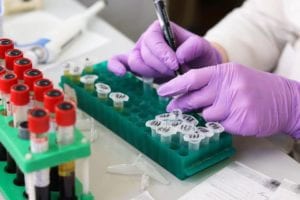In a recent press release, precision therapy company Blueprint Medicines Corporation announced positive results from two clinical trials: EXPLORER and PATHFINDER. The trials examined the safety, efficacy, and tolerability of AYVAKIT (avapritinib) for patients with advanced systemic mastocytosis. Currently, there are few effective treatments for systemic mastocytosis. Additionally, the overall survival rate following diagnosis of aggressive disease is 3 years, with patients with mast cell leukemia only surviving for under 6 months. Thus, positive top-line results from both studies present an opportunity to better treat patients and improve quality of life.
AYKAVIT
Also known as avapritinib, AYKAVIT is a kinase inhibitor. Currently, it is FDA-approved for patients with gastrointestinal stromal tumors (GISTs). However, it is not yet FDA-approved for patients with systemic mastocytosis, though it has received Breakthrough Therapy designation. As of right now, Blueprint Medicines hopes to submit a supplemental new drug application (sNDA) by the end of 2020.
EXPLORER Phase 1 Clinical Trial
The EXPLORER trial is designed to determine the recommended dose of AYKAVIT for patients with systemic mastocytosis. In addition, the trial aims to explore safety, patient outcomes, and symptom reduction. 53 participants enrolled in the trial. Of these, at least 36% reached full or partial remission.
Next, the PATHFINDER trial saw 44 patients treated with 200mg AYKAVIT. Of these, 32 experienced some therapeutic response. However, some adverse reactions did occur. These included worsening thrombocytopenia and mild intracranial bleeding.
Systemic Mastocytosis (SM)
There are multiple forms of systemic mastocytosis (SM), a disorder characterized by excess mast cell levels. According to the Encyclopedia Britannica, mast cells are present in connective tissue throughout our body. These cells:
mediate inflammatory responses such as hypersensitivity and allergic reactions. Mast cells store a number of different chemical mediators—including histamine, interleukins, proteoglycans, and various enzymes—in coarse granules found throughout the cytoplasm of the cell. Upon stimulation by an allergen, the mast cells release the contents of their granules (a process called degranulation) into the surrounding tissues. The chemical mediators produce local responses characteristic of an allergic reaction, such as increased permeability of blood vessels (i.e., inflammation and swelling), contraction of smooth muscles (e.g., bronchial muscles), and increased mucus production.
When mast cells are triggered, they release these chemical mediators, which cause a reaction such as mucus production, bronchial muscle contractions, and inflammation. In systemic mastocytosis, patients have too many mast cells, frequently creating this type of response. For these patients, triggers include alcohol, temperature changes, medication, or even spicy food.
Systemic mastocytosis usually results from KIT gene mutations, such as KIT D816V. Symptoms include:
- Extreme fatigue
- Lightheadedness
- Acid reflux
- Congestion
- Severe itching
- Rash
- Bone pain
- Stomach cramps
- Facial redness
- Loss of consciousness
- Low blood pressure
- Nausea
Learn more about systemic mastocytosis here.








